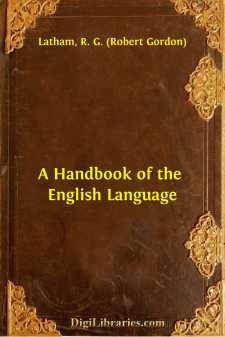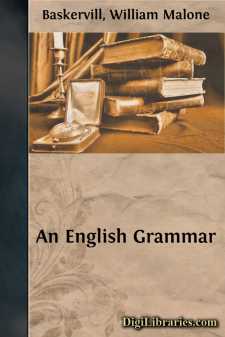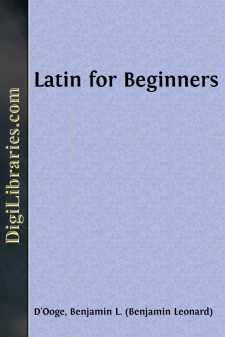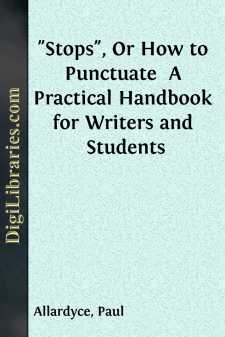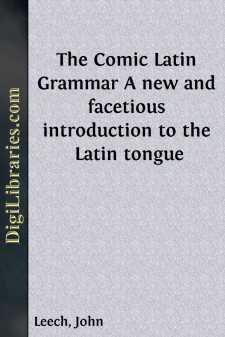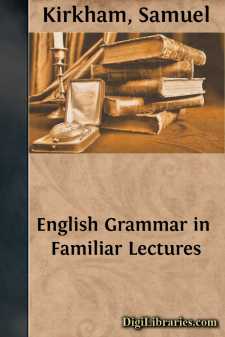Language Arts & Disciplines
- Alphabet 2
- Authorship 5
- Composition & Creative Writing 2
- Etymology 4
- General 30
- Grammar
- Journalism 3
- Phonetics & Phonics 1
- Public Speaking 1
- Readers 2
- Reading Skills 1
- Rhetoric 8
- Semantics 1
- Spelling 2
- Study & Teaching 3
- Translating & Interpreting 2
- Vocabulary 5
Grammar Books
Sort by:
CHAPTER I. GERMANIC ORIGIN OF THE ENGLISH LANGUAGE.—DATE. § 1. The first point to be remembered in the history of the English language, is that it was not the primitive and original tongue of any of the British Islands, nor yet of any portion of them. Indeed, of the whole of Great Britain it is not the language at the present moment. Welsh is spoken in Wales, Manks in the Isle of Man, and Scotch...
more...
INTRODUCTION. So many slighting remarks have been made of late on the use of teaching grammar as compared with teaching science, that it is plain the fact has been lost sight of that grammar is itself a science. The object we have, or should have, in teaching science, is not to fill a child's mind with a vast number of facts that may or may not prove useful to him hereafter, but to draw out and...
more...
LATIN FOR BEGINNERS TO THE STUDENT—BY WAY OF INTRODUCTION What is Latin? If you will look at the map of Italy on the opposite page, you will find near the middle of the peninsula and facing the west coast a district called Latium,1 and Rome its capital. The Latin language, meaning the language of Latium, was spoken by the ancient Romans and other inhabitants of Latium, and Latin was the name applied...
more...
Word study and English grammar are important to the young printer for several reasons. In the first place, disregard of the correct use and combination of words is a distinct mark of inferiority and a serious bar to business and social advancement. A man's use of words is commonly taken as a measure of his knowledge and even of his intelligence. Carelessness in this regard often causes a man to be...
more...
by:
Paul Allardyce
INTRODUCTION The Use of Punctuation.—Punctuation is a device for marking out the arrangement of a writer's ideas. Reading is thereby made easier than it otherwise would be. A writer's ideas are expressed by a number of words arranged in groups, the words in one group being more closely connected with one another than they are with those in the next group. An example will show this grouping...
more...
by:
John Leech
The Author of this little work cannot allow a second edition of it to go forth to the world, unaccompanied by a few words of apology, he being desirous of imitating, in every respect, the example of distinguished writers. He begs that so much as the consciousness of being answerable for a great deal of nonsense, usually prompts a man to say, in the hope of disarming criticism, may be considered to have...
more...
LECTURE I. GENERAL VIEW OF LANGUAGE. Study of Language long considered difficult. — Its importance. — Errors in teaching. — Not understood by Teachers. — Attachment to old systems. — Improvement preferable. — The subject important. — Its advantages. — Principles laid down. — Orthography. — Etymology. — Syntax. — Prosody. Ladies and Gentlemen, It is proposed to commence, this...
more...
INTRODUCTION Punctuation is a device by which we aid words to tell their story. Words have done this at times without such aid, and may now do so, but at constant risk of serious misunderstanding. This can be easily seen by reading the following lines printed as they would have been written in an ancient manuscript....
more...
by:
Goold Brown
CHAPTER I. OF THE SCIENCE OF GRAMMAR. "Hæc de Grammatica quam brevissime potui: non ut omnia dicerem sectatus, (quod infinitum erat,) sed ut maxima necessaria."—QUINTILIAN. De Inst. Orat., Lib. i, Cap. x. 1. Language, in the proper sense of the term, is peculiar to man; so that, without a miraculous assumption of human powers, none but human beings can make words the vehicle of thought. An...
more...
by:
Samuel Kirkham
LECTURE I TO THE YOUNG LEARNER. You are about to enter upon one of the most useful, and, when rightly pursued, one of the most interesting studies in the whole circle of science. If, however, you, like many a misguided youth, are under the impression that the study of grammar is dry and irksome, and a matter of little consequence, I trust I shall succeed in removing from your mind, all such false...
more...


